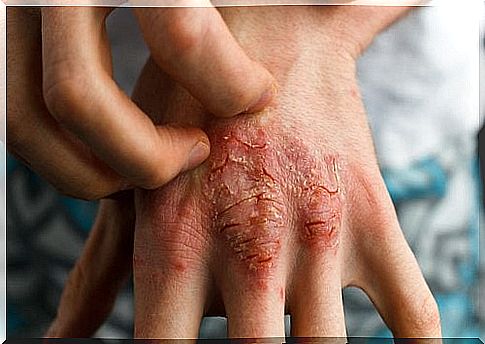5 Tips To Sleep Better If You Have Psoriatic Arthritis

Psoriatic arthritis is accompanied by a series of symptoms that diminish the quality of life. Therefore, patients have to follow a series of strategies that allow them to minimize them. Today we want to review some tips for you to sleep better if you have psoriatic arthritis.
According to research by Dr. Kristina Callis Duffin, professor of dermatology at the University of Utah, itching and pain from this condition can lead to poor sleep quality. This, in turn, increases stress and exhaustion for the rest of the day.
Learn how to combat sleep disturbance in this condition.
What is psoriatic arthritis?

Before going into the details of how to sleep better if you have psoriatic arthritis, it is important to briefly review the basics of the condition. Psoriatic arthritis is a condition that combines joint pain and swelling with psoriasis.
Psoriasis is a skin condition whose symptoms include red, scaly patches on the skin and scalp. It is estimated that 30% of psoriasis cases correspond to psoriatic arthritis. From it we can distinguish several subtypes:
- Symmetric: This type of psoriatic arthritis affects the same joints on both sides of the body. Its symptoms are similar to rheumatoid arthritis (RA).
- Asymmetric: affects a joint or some joints on only one side of the body. Joints may turn red.
- Predominant distal interface: involves the joints close to the nails.
- Spondylitis: involves the spine and can make movement painful.
- Mutilating Psoriatic Arthritis: It is one of the most serious forms of psoriatic arthritis. May cause deformation of hands and feet.
Symptoms of Psoriatic Arthritis
Symptoms of psoriatic arthritis can vary from person to person. In fact, they can be presented intermittently. Sometimes they are mild and at other times they can get worse. The most common are:
- Inflammation and joint tenderness
- morning stiffness
- Muscle pain
- scaly patches on the skin
- scaly scalp
- feeling of fatigue
- Separation of the nail from the nail bed
- Redness of the eyes (conjunctivitis)
Relationship of psoriatic arthritis to sleep

An investigation that was carried out in 2017 determined that 84% of patients with psoriatic arthritis have a poor quality of sleep. Symptoms such as itching, pain from injuries and stress significantly impact this consequence of the disease.
Although it is not a direct cause of insomnia, its side effects can shorten your rest period. Patients often have difficulty sleeping at regular times or have interruptions in rest. In addition, they are more at risk for obstructive sleep apnea.
Tips to Sleep Better If You Have Psoriatic Arthritis
To sleep better if you have psoriatic arthritis, you need to start a series of strategies within your habits. In fact, many of them are recommended by the doctor during disease control. Do you suffer from this condition? Do you have trouble sleeping? Put these tips into practice!
1. Wear comfortable clothes

Although it may seem irrelevant, choosing good clothes can help you sleep better if you have psoriatic arthritis. Choose to keep your skin dry and itching under control by choosing loose cotton or silk clothing. These materials prevent skin irritation while you rest.
2. Do heat and cold therapies
Temperature therapy is one of the ways to relax your joints before going to bed. For some people, the cold temperature works best, while for others it is hot. Try them both and choose the one that provides the most relaxation. Even if you prefer cold or hot, switch between the two temperatures.
3. Moisturize the skin

One of the simplest measures to keep the symptoms of the disease under control is to moisturize your skin regularly. If symptoms tend to get worse during the night, it may be convenient to use a moisturizer before bed. Choose to use natural alternatives such as coconut oil or shea butter.
4. Apply a relaxation technique
Yoga, meditation, and other relaxation methods are excellent alternatives for better sleep if you have psoriatic arthritis. These therapies promote joint relaxation and reduce the stress that comes from symptoms. They can be put in place about 30 minutes before going to bed.
5. Aromatherapy

The benefits of aromatherapy are used as an adjunct to reduce the symptoms of many conditions. Thanks to the properties of some essential oils, they are a good choice for reducing the stress and other discomforts of psoriatic arthritis. They can even help to reduce pain.
Be sure to use fragrances such as:
- Lavender
- Chamomile
- Mint
- Lemon
- Sandalwood
- Romero









